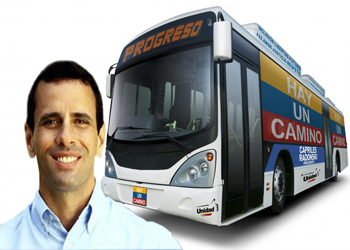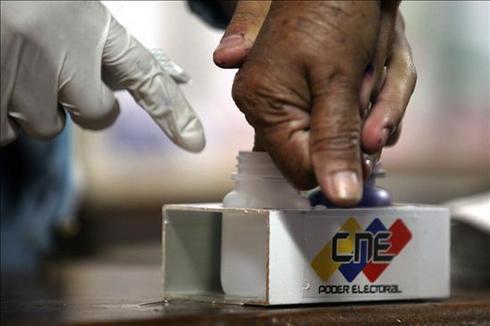THE BANDWAGON EFFECT AND THE POSSIBILITY FOR CAPRILES TO LOSE THE ELECTIONS
Written by Andrés Volpe.
Translation by Alex Gamero Garrido.
Freedom granted only when
it is know beforehand that
its effects will be beneficial
is not freedom.
Friedrich A. von Hayek.
 “Ride the bus of improvement”, is perhaps one of the phrases that have been highlighted the most during the electoral campaign. Nevertheless, the reason its success is not its innovation; on the contrary, it’s a very old political technique. It had its origin in the political campaign of a clown called Dan Rice, who in 1968 tried to become President of the United States of America. His campaign was successful and many American politicians rode their bandwagon, or as we should say nowadays in Venezuela, the autobús.
“Ride the bus of improvement”, is perhaps one of the phrases that have been highlighted the most during the electoral campaign. Nevertheless, the reason its success is not its innovation; on the contrary, it’s a very old political technique. It had its origin in the political campaign of a clown called Dan Rice, who in 1968 tried to become President of the United States of America. His campaign was successful and many American politicians rode their bandwagon, or as we should say nowadays in Venezuela, the autobús.
However, the idea of the bandwagon has taken a different connotation. In political communication and group psychology it is defined as the effect that occurs when a belief or opinion enhances its probability of being accepted proportionally to the quantity of people who already accepted it, even though its foundations are illogical and irrational. This follows also the philosophical current in which reality is whatever one wants it to be, consequently everything is subjective and follows a perception which can be seen as authoritarian, since it doesn’t contemplate the possibility of being contradicted or denied.
What does this mean for the 7-O? Translator note: 7-O refers to October 7th, 2012, when the Venezuelan Presidential elections are scheduled to take place
Considering the fact that the electoral support of both candidates is by all means equal, and there is only an ambivalent difference, it can be inferred that it’s possible for either or the candidates to win. Thus, if we follow the principle earlier stated, we can conclude that the winning candidate will be that who most strongly demonstrates his “assured” victory. In other words, if Chávez is able to show that he can overcome his cancer and at the same time continues on being the same messianic leader, more people will vote for him.
 The risk of the bandwagon effect is critical whenwe go back in our memories and remember that the biggest employer in the country is the State. It is then when voting in Venezuela will become mere surviving instinct. Public employees will only vote against their employer if they know that Capriles’s victory is secured. On the other hand, if Capriles shows that he has what it takes to win, the number of votes he’ll from the public sector will increase.
The risk of the bandwagon effect is critical whenwe go back in our memories and remember that the biggest employer in the country is the State. It is then when voting in Venezuela will become mere surviving instinct. Public employees will only vote against their employer if they know that Capriles’s victory is secured. On the other hand, if Capriles shows that he has what it takes to win, the number of votes he’ll from the public sector will increase.
This is very simple, but the obstacles to the vote rationality are not unknown; moreover, in Venezuela there is an information crisis, during which the information the voters need to make a rational vote is monopolized by the State. Because of this, the common uninformed voter will be more susceptible of adopting a position only because it is presented to him as the pretended majoritarian opinion. It could be a consequence of either the fear to dissent from the social nucleus, or conformism, or not wanting to take the risk to lose the misiones (translator note: misiones refers to the social programs that the Chávez’s government have enacted), but the fact is that in Latin America populism has been the fatal cause of the failure of the attempts to instate a liberal democracy. Additionally, it is also a known fact the short-term minded mentality of the Venezuelans when they choose their government.
It is also important to consider that the Venezuelan State is the owner of many mass-media networks over which he can broadcast his party line, both in the capital and in the rest of the country. This should not occur in a liberal democracy, since it is presumed State media won’t be used in the government’s political campaigns, but unfortunately here it is even compulsory – enforced by law – for private media to broadcast, without charging for it, messages where they compare the President with Bolívar and place him immediately below God.
Furthermore, the effects of the bandwagon effect affect the vote of the voters that have not decided yet, and mercantilist government contractors, since due to an irrational fear, or for other less noble reasons, will arguably vote only for the winner or they won’t vote at all.
In conclusion, Capriles’s message must be the strongest and most triumphal, just like it has been so far. The best start he could have had was in front of the CNE (translator note: CNE stands for Consejo Nacional Electoral or the National Elections Council) when he even managed to ridicule the chavista concentration the day after. He’s denied the blurry polls and keeps on doing it following excellent campaign management. However, a triumphal attitude can be fatal especially when facing a speech expert, the Venezuelan President. Riding the bandwagon of improvement can take us to the achievement of even convincing the irrational nowadays chavista.
- Irán vive días de zozobra – The New York times - 17 febrero, 2026
- Diálogo entre bots, ¿una experiencia religiosa? - 7 febrero, 2026
- Quitar el color en mi celular me hizo apreciarlo más en la vida real – The New York Times - 29 diciembre, 2025
